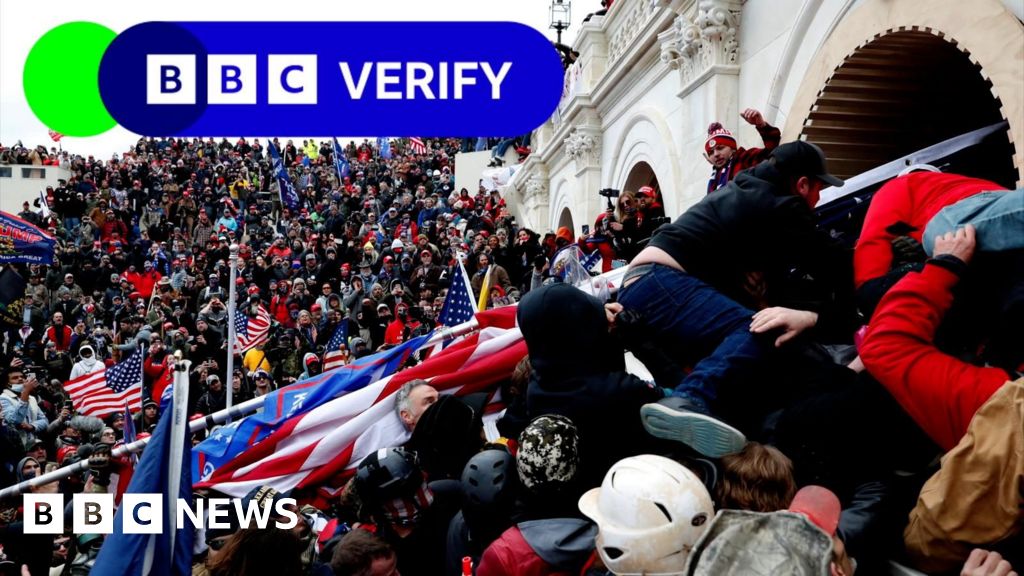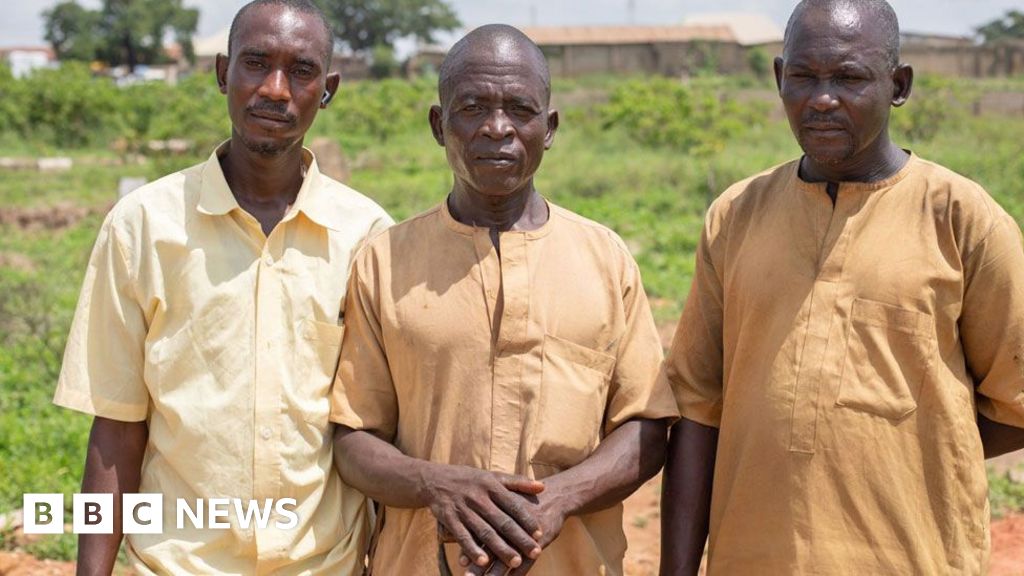ARTICLE AD BOX

The images have been searing. Children scrabbling in the dirt, gathering handfuls of spilled flour which they stuff into their pockets.
Aid trucks surrounded by angry mobs of mostly young men, who attack the drivers and make off with whatever they can carry.
And young Maryam Abed-Rabu, trying but ultimately failing to stay composed as she answered a journalist's questions about the daily struggle to stay alive.
A girl who has already been through so much, including the loss of her father, wailing at her inability simply to find bread.
Northern Gaza is almost entirely cut off from the outside world. The population, estimated at around 300,000 people, reduced to a feral existence in a world where shops barely exist and aid never arrives.
The south, meanwhile, is crammed with the displaced - hundreds of thousands of people constantly on the move, looking for food, shelter and safety.
Israel says it's doing what it can to limit the suffering of civilians, but four and a half months of relentless military assault have left the Gaza Strip on its knees, with aid agencies unable to cope.
"Every time you go back it gets worse," Jamie McGoldrick, the UN's interim coordinator for the Palestinian territories, said on Friday.
Just back from his latest visit to the Gaza Strip, he found despair was rife.
Image source, Reuters
Image caption,Palestinians carry bags of flour from an aid truck in Gaza City
"People feel as though this is the end of their journey."
At the far southern end of the Gaza Strip, between 1.2 and 1.5 million people are crammed into every available space in and around the city of Rafah.
Nearby, in the sandy coastal area known as al-Mawasi, designated by Israel as a humanitarian safe zone, at least 250,000 people are now living in flimsy accommodation with little support.
Doctors working for the British medical charity UK-Med have watched a tent city springing up around them.
"Two weeks ago, there were one or two tents dotted along the beachfront," UK-Med's CEO David Wightwick told me on a scratchy line from his al-Mawasi base.
"They're now six tents deep."
A few miles south is the crossing point Israelis call Kerem Shalom (Karem Abu Salem in Arabic), where almost all aid destined for the Gaza Strip enters, after exhaustive Israeli checks.
At a holding area on the Palestinian side, aid is offloaded and reloaded onto local trucks, for distribution throughout Gaza.
The trucks traverse a 3km corridor to the "blue gate" at Rafah, before entering Gaza.
But the collapse of security in Gaza means that for some of the aid, the journey never really begins.
Trucks are attacked and looted inside the corridor.
Much of the looting is by organised Palestinian gangs, with donkey carts and vehicles waiting across the fence and spotters reporting the arrival of aid.
But for those trucks lucky enough to reach the blue gate, the problems have only just begun. Much of what happens next is opportunistic, and frequently violent.
"Many of these trucks, before they even get 200 metres, are stopped by cars, attacked and looted," Mr McGoldrick said.
With just a few roads available for aid deliveries, and most convoys travelling in the early hours of the day, the UN says people are using social media to alert each other to the movement of convoys, allowing roadblocks and ambushes to be set up in advance.
Image source, DPA / Alamy
Image caption,A truck loaded with German aid enters Gaza through the Kerem Shalom border crossing
"People know when we're coming," Mr McGoldrick said.
The envoy said he had seen trucks with windows and rear-view mirrors smashed. He said he had spoken to traumatised drivers, who'd had axes thrown through their windscreens and come under fire.
Rather than reaching UN warehouses and being distributed in an orderly fashion, aid often ends up being sold in street markets at vastly inflated prices which few can afford.
After a World Food Programme truck was hit by gunfire on 6 February (the UN blamed Israeli naval gunfire), WFP suspended all aid deliveries to the north.
Attempts to resume deliveries this week collapsed amid scenes of violent looting.
The UN says it has approached Israel about opening up supply routes from the north but that discussions are at an early stage.
The hope - a slender one at the moment - is to reduce incentives for looting by dramatically increasing the volumes of food and other essential goods entering Gaza.
"We need to flood the north with aid," Mr McGoldrick said, "so it doesn't become a product that people want to use for extortionist purposes or the black market."
Israel, for its part, says it is doing what it can to facilitate the arrival of humanitarian assistance.
"We are doing everything in our power… to reduce any harmful consequences of the war [to] the civilian population," Col. Moshe Tetro, head of the military's coordination and liaison administration for Gaza, told reporters at a briefing this week.
On Friday, the military said more than 13,000 trucks, carrying over 250,000 tons of humanitarian aid, had entered the Gaza Strip since the start of the war.
That's a little over 90 trucks a day, way below the 500 UN staff say is needed to meet the growing demands of a hungry, sick, repeatedly displaced population.
Israel says the problems with aid distribution are not of its making, despite the fact that the chaos reigning inside the Gaza Strip is a direct consequence of its military assault.
"Unfortunately, today and yesterday, the UN didn't show up for work," Col Tetro said.
Delays on the Palestinian side, he said, were leading to a backlog of trucks waiting to enter Gaza.
"The UN should increase their capabilities inside Gaza."
But in recent weeks, security has been further eroded by a series of Israeli attacks on civilian police officers.
According to David Satterfield, the Biden administration's envoy for humanitarian issues, such attacks had made it "virtually impossible" to distribute aid safely.
For the UN, Israeli calls for it to do more sound hollow.
The Israeli government has embarked on a campaign to dismantle UNRWA, the UN agency responsible for assisting Palestinian refugees, following allegations that as many as 13% of UNRWA's 13,000 staff in Gaza were also working for Hamas, with some even participating in the murderous attacks of 7 October.
The UN says it's investigating but that Israel has yet to share its intelligence.
In the meantime, the Netanyahu government has already started stripping UNRWA of its functions.
Responsibility for 29,000 metric tonnes of flour from USAID, currently stored at the Israeli port of Ashdod, has already been transferred to the World Food Programme.
In an anguished letter to the UN General Assembly on Thursday, UNRWA's director Philippe Lazzarini said the agency had reached "breaking point" and listed a number of measures the Israeli government was taking to hamper its work, including limiting visas for international staff, blocking an UNRWA bank account and suspending the shipment of UNRWA goods.
Bad as it is at the moment, the thought of an all-out Israeli assault on Rafah, which the government threatens to do if Israeli hostages are not released before the start of Ramadan on 10 March, raises fears among aid workers that the worst is yet to come.
UK-Med's David Wightwick has already had a glimpse.
When he drove to Khan Yunis to extract a medical team from Nasser Hospital, he found himself surrounded by crowds of desperate people.
"The prospect of that happening in Rafah and al-Mawasi, where you've got hundreds of thousands of people is not one I think you really want to contemplate," he told me.

 10 months ago
79
10 months ago
79








 English (US) ·
English (US) ·